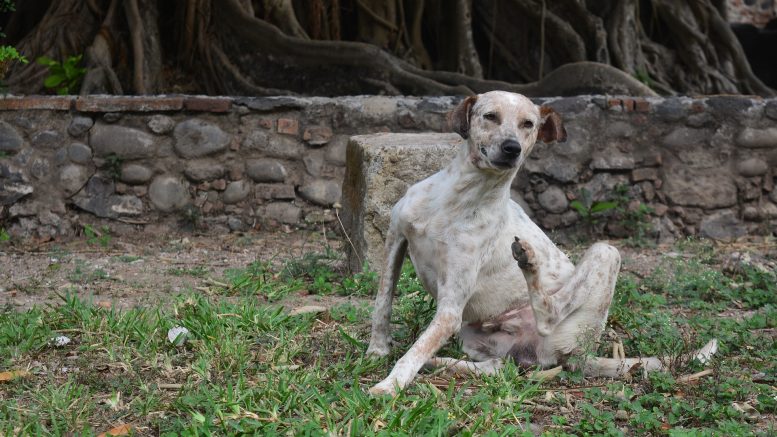Reprinted with permission of Dr. Will Falconer, DVM
When you have a crazily itchy dog or cat, everybody suffers. Patients in this state often keep you up at night and drive you crazy during the day dealing with the mad itch.
Scratching, biting, losing hair, skin red and inflamed, these guys often stink, ooze sticky moisture from their skin, and many can’t get comfortable long enough to take a decent nap, let alone sleep the night through.
Talk about a pain for you and your loved ones! At the base of wildly itchy animals is the immune system, which is working overtime, but malfunctioning. “Dysregulated” is a term used in the scientific papers. (We have to insert a wink here because immune system dysregulation is entirely a man-made disease. More on that later.)
Interestingly, most look right past that important man-made point and seek to “fix” the itchy beast with powerful drugs. Enter the latest anti-inflammatory drug to make a splash in the veterinary market: Apoquel (oclacitinib).
And lest you think I’m recommending it, you’ll want to read on for the details about why an abundance of caution is recommended before you plunk down your hard-earned money and start your dog down a potentially dangerous path. Apoquel is not for puppies. Or cats or people. It’s Apoquel for dogs that we’re talking about.
Born from the loins of the world’s largest drugmaker, Pfizer, their former division Zoetis is now the “animal health” giant that brought this much-touted wonder drug to market in 2014. How big is Zoetis? $4.34 billion in revenue in 2012, before Apoquel had even hit the market.
So, it’s BIG.
Stops Itch FAST! The claims of Apoquel and even the actual results in itchy dogs are amazing. “Provides onset of relief within 4 hours. Effectively controls itch within 24 hours.”
Irresistible, right?
After you’ve lost sleep for weeks on end and tried everything offered you by Dr. WhiteCoat and Dr. Google without success, wouldn’t this sound like heaven in a pill?
Apoquel: How Does it Work?
Ah, now you’re asking a smart question. How Apoquel works is the key to why you need to be smart. In fact, you need to be smarter than the marketers, smarter than Zoetis, and smarter than Dr. WhiteCoat, who’d all be tickled to sell this to you.
It works! But why should we take Zoetis’ word for it. Given that they did safety and efficacy research for only 30 days, I’m not so sure. And then there’s this: can you say conflict of interest?

Pull up a little closer to the campfire for this part, because here’s where the story gets good. To know how the drug works, you should know first how The Itch works. Here’s what a board-certified veterinary dermatologist says causes The Itch:
- Flea allergy dermatitis
- Atopic dermatitis
- Food allergy dermatitis
- Contact dermatitis
- Sarcoptic mange
- Demodectic mange
I really, really wish I was making this up. This vet is merely listed itchy diseases, but nothing about their causes. While this explanation is seriously lacking in the “why?”, the part he does get right is this: itchy, allergic skin is the #1 reason pets go to vets. This has been true for about 15 years now. Hard insurance data tell no lies.
Remember that wild and crazy immune system spoken of earlier? The one that’s off the rails, acting all whacky and dysregulated? That’s what Apoquel is acting on. It’s being called an “immune modulator” by the experts. That’s an enticing way of calling out its action. Sounds suspiciously benign.
Keep reading though, and you’ll see that it’s anything but. Here’s a brief description of how this “wonder drug” called Apoquel works.
 If you like what you’re reading here by Dr. Falconer, be sure to sign up for a membership to hear Dr. Tenpenny’s interview and Deep Dive with Dr. Falconer on general animal health! Below is a short excerpt from that interview.
If you like what you’re reading here by Dr. Falconer, be sure to sign up for a membership to hear Dr. Tenpenny’s interview and Deep Dive with Dr. Falconer on general animal health! Below is a short excerpt from that interview.
Immunology 101
First, an important understanding. While it might seem like we know a lot about the immune response, there are still large swaths of mystery we don’t yet comprehend. By its very nature, this is one complex system! If we didn’t have it, we’d have been lost as a species a very long time ago, right along with our pets and our livestock. That said, we know there are lots of messenger molecules involved.
And sweeping events called cascades, where the right trigger (a virus, say) causes a series of chemical messages and events that, when all is working well keeps you and your animals out of harm’s way.
“Yo. We Need to Talk”: One group of immune messengers are called cytokines. These small molecules are produced by a wide variety of cells, and they signal other cells to do something like come to the scene of infection, let loose their chemicals, take part in signaling others, dump antibodies, etc.
You’ve likely heard of some cytokines before: interferon, interleukins, tumor necrosis factors.
When inflammation is triggered, these chemical messengers call in the troops: “It’s time to heal!”
(More on inflammation in context here. It’s not the enemy, by the way.)
Enter Apoquel (oclacitinib). A couple of words hidden in those names. A whole class of inhibitory compounds man has invented have “inib” at their end. Short for inhibit. And “quel?” You get that one. Chill out this hot mess of inflammation! So, this drug seeks to stop a piece of the inflammatory chemical cascade by interfering with certain enzymes called kinases, or JAK in the literature, which stops some cytokines from doing their thing.
And it works! But like all things that “work,” we need to look a bit deeper if we want to raise truly vital animals. “Work” can mean cure but it more often means palliation. Palliation means, while the medicine is being given, the symptoms are relatively controlled. The animal is no better overall and once the drug stops, the symptoms return. In the meantime, the disease is slowly growing and getting less likely to be able to be cured.
Usually, there’s a price to pay in long term health when we interfere with Mother Nature, and this drug is no exception.
Apoquel and Long Term Safety? Not So Much.
My Texas colleague Dr. Ron Hines has done a brilliant job of cataloging feedback from animal owners actually using this drug. You, dear readers, have also contributed many, many of your own experiences in the comments on this article. When you read past the glowing reports of “Hallelujah! Peace at last!” you start to pick up a theme.
Those who’ve been using this drug for a while are seeing two common problems. Variations of these occur in most all drugs, in fact, not just this one: side effects, and no longer helping as much as it did at first. My original article has several testimonials like this one, a story of a Bishon who had eight months on the drug:
“The drug has given my dog (four years old) a quality of life I never thought was possible. He also receives an allergy serum injection every ten days. However, for the past several weeks his nose has been running constantly and as of late he has been gurgling rather than breathing. Two days ago, his nose was bleeding. I stopped the Apoquel immediately and will see the allergist this week. Most importantly, two days after I stopped the Apoquel, his nose dried up, no more running and no more blood. I cannot help but assume that the Apoquel was the cause of his misery.”
Can Apoquel Cause Cancer in Dogs?
Before I share some real dog, real people experiences, let’s make sure you are aware of something. Did you know that, for decades now at least, immunologists have known that you and I and every animal on the beautiful blue planet are making “mistakes” in our cells every day? They are called mutations, and they happen during cell division, which is pretty much a non-stop process in a living being. When you’ve worn out a liver cell or you’ve got to knit a cut back to normal closed skin, it’s cell division that makes this possible. But, like all biological systems, cell division isn’t a perfect process. Some “oopsies” happen, and the copy comes out wrong. Some mutations are harmless, and some, when certain genes are involved, cause runaway cell division way past what’s necessary.
The result? Tumors. Tumor cells are in me and you and your dog right now. The understanding of those steeped in immunology is that it’s our immune system that is the sole reason every mutation that starts running wild in cell division doesn’t create cancer. The third process is referred to as tumor immune surveillance, whereby the immune system identifies cancerous and/or precancerous cells and eliminates them before they can cause harm. The idea that the immune system, which so effectively protects the host from microbial pathogens, might also recognize and destroy tumor cells was first discussed over a century ago and has recently been reviewed in detail.
We likely have regular battles waged on cancer cells that never become tumors. Why? Our immune system correctly “saw” these cells as foreigners, and called in the guard, like white blood cells, complement, interferon, natural killer cells, etc. And like those kinases, known to be great communicators that help coordinate the attack on the wayward cells leaning towards becoming cancerous.
What’s Apoquel good at? Taking out some of those kinases, remember? Is an immune communication breakdown possible, when we mess with the kinases? I’d bet on it.
But it’s as if Zoetis never got the memo about how important our immune system is to prevent cancer: APOQUEL may increase the chances of developing serious infections, and may cause existing parasitic skin infestations or **pre-existing cancers** (emphasis mine) to get worse. — company literature
Pre-existing cancers? Isn’t that what we’ve known about for all these decades? They are ALL pre-existing until they get a green light to grow, aren’t they?
Here’s an excerpt from the many comments on the original article.
Linda, young German Shepherd: My 4 year old dog was on it for itching. She died 2 months later with lymphoma.
Click on the pic above for more product info
Carley, 7 year old Aussie Shepherd:Does anyone else’s dogs have hard lumps in their lymph nodes? Unfortunately my dog was diagnosed with lymphoma after using Apoquel.
Bruce M, Boxer: On June 23, I began to give my Daisy the Apoquel pill. Within a week, her under-jaw lymph nodes began to swell. Her lymph nodes were swollen behind her legs, too. A biopsy indicated lymphoma. I asked the vet if Apoquel expedited her cancer and he said yes that it compromised her immune system and allowed the cancer to take over.
Too Good to Be True? I’d Put Money On It.
So, a big caution here, as with all “miracle” drugs: if it’s interfering with your dog’s immune system, and running out of gas after a certain period of use, is there any hope that it will cure your dog’s itch? Of course not. Drugs never cure chronic disease. They cannot.
++++++++++++++++++++++++++++++++
 Like what you’re reading on The Tenpenny Report? Share this article with your friends. Help us grow.
Like what you’re reading on The Tenpenny Report? Share this article with your friends. Help us grow.
Get more of Dr. Tenpenny’s voice of reason at her website.
Join our list here
++++++++++++++++++++++++++++++++
Will Falconer started out in conventional veterinary practice in 1980, using all the latest drugs and surgeries. Around 2010, he made the connection that his sick animal patients were often falling ill from veterinary intervention that ironically was being done in the name of prevention. He realized that many animals were victims of over-vaccination, toxic pest control and toxic, lifeless diets. Today, he is a certified veterinary homeopath, and his purpose is to help you sidestep the damage of conventional “prevention” with a better way, one he calls “The Natural Path.” Visit his website here. And be sure to read Part Two of this article where he looks at the real causes of The Itch, and immune dysregulation, and sign up for his Apoquel Alternatives report here.


